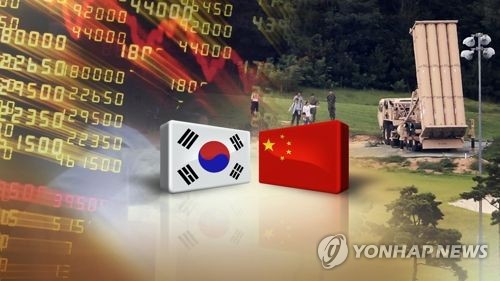ID :
467965
Wed, 11/01/2017 - 02:02
Auther :
Shortlink :
http://m.oananews.org//node/467965
The shortlink copeid
S. Korea, China move to put year-long THAAD feud behind them

SEOUL, Oct. 31 (Yonhap) -- South Korea and China said Tuesday they have reached an agreement to speedily recover their relationship, a move that is likely to put behind them a diplomatic and economic feud that stemmed from a military deployment and has lasted more than one year.
"The two sides agreed to continue discussing the THAAD issue, which the Chinese side is concerned about, through a channel of dialogue between their militaries," South Korea said in a statement following negotiations between the two countries.
"Sharing the view that enhancing exchanges and cooperation between South Korea and China complies with their mutual interests, the two sides agreed to quickly normalize their exchanges and cooperation in all areas," a statement by the Ministry of Foreign Affairs said. China's foreign ministry simultaneously released its own statement that matched the South Korean one.
The step marks a major turning point in the South Korea-China relationship, which has soured to reach its lowest ebb over the past 13 months as a result of both Seoul's announcement in July last year that it would bring in the U.S. missile interceptor Terminal High Altitude Area Defense (THAAD) and the system's actual deployment in the southern county of Seongju this year.
It is the biggest bilateral diplomatic challenge South Korea and China have suffered since they turned from Korean War foes into mutually-recognized diplomatic partners in 1992. They proclaimed a "strategic cooperative partnership" in 2008, and China is currently South Korea's biggest trading partner.
South Korea's travel, entertainment and retail industries, substantially dependent on Chinese consumers, were hit hard when China unofficially boycotted South Korean goods and entertainers in retaliation for the missile interceptor system. Two giant South Korean discount store chains, E-Mark and Lotte Mart, have recently decided to pull out of the Chinese market in the aftermath.
South Korea said the deployment was unavoidable in order to counter North Korea's worsening nuclear and missile threats, but China protested that it would compromise its national security interests. There seemed to be no way out until nascent signs of fence-mending were shown in recent weeks: South Korea and China renewed their bilateral currency swap deal in October, as well as ministerial defense talks after a two-year hiatus, and China started to allow sales of tour packages to South Korea.
The final deal came after Chinese President Xi Jinping secured his second five-year term as the head of state at the recent congress of the Communist Party of China, which gave him fresh authority to shape China's foreign policy.
More importantly, the decision came amid the growing urgency of having to rein in North Korea's advancing nuclear weapons capability and the resultant increasing presence of the United States in the Northeast Asian region. The trilateral cooperation between the U.S., South Korea and Japan is also an impediment to China's ambition for Asian supremacy.
The foreign ministry statement said that as part of the agreement, China voiced concerns over the possibility of building an U.S. Missile Defense (MD) system in South Korea and the deployment of an additional THAAD batteries, as well as the military cooperation of South Korea, the U.S. and Japan.
In response, South Korea reiterated its previous stance, the statement said, referring to Foreign Minister Kang Kyung-wha's parliamentary remarks a day earlier.
She made clear during a parliamentary audit session that South Korea will not join the MD network and will not go for additional THAAD deployment. She also said the trilateral security cooperation the country has with the U.S. and Japan will not turn into a joint alliance.
"South Korea recognized China's concerns related with the THAAD issue and made it clear that the deployment is not intended for a third country and does not impair China's strategic, security interests," the statement said.
"China again proclaimed its opposition to the THAAD system deployed in South Korea, for the sake of its national security maintenance," the statement said, still leaving open the potential for a recurrence of a bilateral rift over the deployment. "China keeps South Korea's stated position in mind and hopes for South Korea to properly deal with the related issues."
The agreement immediately opened up top-level diplomacy between Seoul and Beijing. The presidential office Cheong Wa Dae said President Moon Jae-in will meet with Xi on the sidelines of the Asia Pacific Economic Cooperation (APEC) forum, which is slated to run Nov. 10 and 11 in Vietnam.
Seoul is also planning for Moon's first visit to China by the end of the year, as well as Xi's trip to South Korea in February on the occasion of South Korea's hosting of the Winter Olympics next year. Those moments will further help the neighbors iron out the wrinkles in their renewed relationship.
"Holding a summit of the two leaders (in Vietnam) is the countries' first step to implement the agreement to speedily recover their exchanges and cooperation in all sectors to the normal level," said Nam Gwan-pyo, director of the presidential National Security Office, who negotiated the latest agreement with Chinese Assistance Foreign Minister Kong Xuanyou.
pbr@yna.co.kr
(END)





